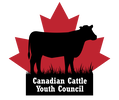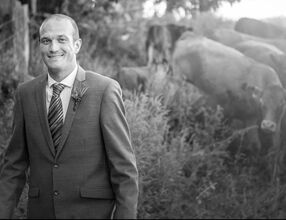|
The Canadian Cattle Youth Council is looking for two young Canadian beef producers passionate about the success of the industry!
The youth council is now collecting nominations for:
To put your name forward, please follow the link below to complete the nomination form and submit the additional video bio requirement outlined in the form by Sunday, July 14, 2024. You can only put your name forward for the Youth Council Member at Large Position OR the Canadian Beef Check-Off Agency Youth Member Position, not both. After the deadline, new this year, the Member at Large submissions will be voted on by the 10 Youth Council Delegates. The results will be announced at the Youth Council AGM on August 20, 2024, in Saskatoon at the Canadian Beef Industry Conference. Please stay tuned to your inbox for an invite coming shortly for membership to join the Youth Council AGM. For the Check-Off Agency Youth Member position, Youth Council Delegates will vote shortly after the submission deadline on whose name they will put forward to the Agency board. The successful candidate will be notified mid-July to arrange travel to CBIC. The Youth Council and Beef Check-Off Agency will be holding their AGMs at CBIC on August 20, 2024. If you would like to learn more, please go to “Join the Council” on our website, or direct your questions to [email protected]. More details can be found in the nomination form and links below. Nomination form: Member at Large Nomination form: Check Off Agency
0 Comments
Submitted by Scott Gerbandt, Youth Council President and Domestic Ag Committee Rep
I attended the Canadian Cattle Association (CCA) Domestic Ag Policy and Regulations Committee meeting at the Canadian Beef Industry Conference in Calgary, AB in August 2023. Some of the topics discussed at this committee are:
Submitted by Laura Plett, Youth Council Member at Large (MB) and Environment Committee Rep
On August 15, 2023, Kimberley Lansdall and I attended the Environment Committee meeting of the Canadian Cattle Association at their Semi-Annual Meeting in Calgary, AB. Mike Duguid chaired the meeting, as we discussed several prominent issues since the AGM in March 2023. The SARPAL Term Conservation Easement was one of the updates we received. Reports and reviews have been ongoing with the Federal Chief Appraisers Office and Environment and Climate Change Canada. We now have an MOU in place to support our work on the development of a Term Conservation Easement. We are in the process of exploring different value & income approaches, working with other Commonwealth countries for reference. Canada’s National Index on Agri-Food Performance has also been an ongoing project, with the goal of measuring the breadth of sustainability. Founder and National Coordinator David McInnes updated us on recent activities. The intention for this initiative is to leverage competitiveness for the sector by backing sustainability claims with better performance data, both here and abroad. This index is supported by 135 different organizations, which are working to use it as a tool to help deliver on the vision “Canada is recognized as a world leader in sustainable agriculture and agri-food production”. The CRSB is a member of the Steering Committee and has been participating in working groups to develop metrics for this index. We discussed the ongoing drought in some parts of Western Canada, and identified other environmental challenges in the rest of the country as well. We look forward to seeing how these and other issues and opportunities develop over the coming months until we meet again at the Canadian Cattle Association AGM this winter in March 2024. 6/23/2023 0 Comments Call for nominations: Join the canadian cattle youth council as a member at largeThe Canadian Cattle Youth Council is looking for a young Canadian beef producer passionate about the success of the industry! The youth council is now collecting nominations for a two-year term Member at Large Delegate position. To put your name forward, please download and complete the nomination form (attached at the bottom of this post) and submit alongside the additional video bio requirement outlined in the document by Monday, July 17, 2023, to [email protected]. After the deadline, submissions will be circulated with youth council membership for a virtual vote in the weeks ahead of the Youth Council AGM on August 15, 2023, held at the Canadian Beef Industry Conference in Calgary, AB. The results will be announced at the Youth Council AGM. Options are being explored for youth council members and nominees to join the meeting virtually or call in. If you would like to learn more, please go to “Join the Council” on our website, or direct your questions to [email protected]. More details can be found in the nomination form below. *Please note that the nomination form should be downloaded on your computer, as they may not be accessible on all mobile devices. If you have any questions or concerns, please contact [email protected].
The Domestic Agriculture Policy and Regulations (Domestic Ag.) Committee had a great meeting at the Canadian Beef Industry Conference in Penticton in August. Several of the committee’s current files may be of interest.
Next Policy Framework: The Next Policy Framework, renamed the Sustainable Canadian Agricultural Partnership, will be the next 5-year framework. It replaces the Canadian Agricultural Partnership in March 2023. In September 2021, the "Guelph Statement" outlined the policy's framework which includes: investment in research, climate change, sustainable productivity, and value-added agri-food and risk management. In July, CCA representatives (including YCC staff support, Jessica Radau) joined in discussions with Federal, Provincial and Territorial Ministers of Agriculture to conclude the negotiation of the framework. Highlights of what was announced, include a 25% overall increase in funding, the Resilient Agricultural Landscapes Program and improvements to business risk management (BRM) programming. The committee discussed the environmental overlay that was announced for the AgriInvest and AgriInsurance programs. While the overlay isn’t pervasive, the Committee was concerned about the precedent it might set for the rest of the BRM programs. The Committee also noted the requirement of an Environmental Farm Plan, as a condition for participating in AgriInvest should be broadened to allow for the inclusion of industry verification programs, such as the Canadian Roundtable for Sustainable Beef verification framework. Governments are also considering using reduced AriInsurance premiums as a means to encourage the adoption of practices that help mitigate environmental risks. Potential pilots will be identified and explored at the provincial level. CCA staff will identify potential pilots that might contribute to reduced forage insurance premiums. Business Risk Management: The committee focussed its discussion on different options to overcome the federal government’s reluctance to support producer premiums under the Livestock Price Insurance Program. Federal government officials have outlined four key concerns:
CCA staff will be developing a series of arguments to address the government’s concerns. These will include noting the negative implications of the current inequities within the BRM suite on the preservation of grasslands and pastures. The Canadian Cattle Association’s (CCA) Environment Committee held their Semi-Annual Meeting in beautiful Penticton, British Columbia on August 16. Outgoing YCC member Holly Sparrow and I were very fortunate to attend and take part in several important and informative discussions around issues and developments within our industry.
During this meeting we had an informative presentation from Stacey Domolewski, the Extension Coordinator of the Beef Cattle Research Council, outlining their 5-year funding plan, and highlighting the allocations for environment, forage, and grassland productivity research. Stacey also went over the findings from a project based on the impacts of Canadian beef production on biodiversity, and an integrated forage, cattle, and timber management project. These results were very interesting to hear and continue to support the story of how cattle have a positive effect on our environment. We also received an update from Larry Simpson, from the Nature Conservancy of Canada (NCC). Larry provided an overview of a draft initiative which would conserve native grassland by working with ranchers, land trusts and conservation organizations. The NCC, along with members of this environment committee, has come up with a few options for ranchers. These include
Any of these would be voluntary, with the purpose being to provide ways to protect native grassland by providing revenue to encourage the successional transfer of ranches to our generation; therefore keeping these ranches and their landscapes intact. Larry Thomas, Environment Manager, updated us on the federal government’s recent announcement of the Resilient Agricultural Landscapes Program, which we are very grateful for. The CCA and this committee will continue to work with them to make sure the program is accessible and fits producers’ needs. I look forward to hearing how this, and the other initiatives have progressed by our next meeting at the Canadian Cattle Association’s Annual General Meeting in the new year. Animal Health Emergency Management: Bob Burden of Animal Health Emergency Management gave a global report on the AHEM II projects which are underway. The AHEM II focuses on the following six activities which are related to disease outbreak in Canada:
A detailed explanation of Canada’s level of preparedness for the occurrence of a case of Foot and Mouth (FMD) was given. The planned association and governmental response to a positive case emerging in Canada was outlined. Two representatives from the National Cattlemen’s Beef Association (NCBA) updated the committee on the current status of the North American FMD Vaccine bank. The implementation of a new US only FMD Vaccine Bank was outlined. Funding and operation of the current North American FMD Vaccine Bank is now uncertain due to the withdrawal of Mexico and the new parallel American Vaccine Bank. The delegates from NCBA suggested that CCA work with all levels of government to implement a national Vaccine Bank in Canada. Transportation Regulations and Transfer of Care Documents Drs Heather Brown and Marie-Odile Rozon of the Canadian Food Inspection Agency (CFIA) gave an update on the requirements of the transfer of care document (ToC) and the animal transport Record (ATR). Transfer of Care Document (ToC)
Animal Transport Record (ATR)
Verified Beef Production Plus (VBP+): Shannon Argent of VBP+ gave an update regarding the new International Financial Reporting Standard (IFRS) which some banks may be requiring for new loans. The IFRS would potentially require the equivalent of an environmental farm plan when applying for new loans from the bank. The possibility of VBP+ incorporating the environmental farm plan into the auditing system was discussed as an option to help fulfil these new banking requirements. Food Policy – CCA Semi-Annual Meeting Update
A high priority for the Food Policy Committee since CCA’s AGM was the front-of-package labelling proposed by Health Canada. CCA’s advocacy work included meeting with elected and bureaucratic officials, media outreach and the very effective #Don’tLabelMyBeef social media campaign which also included the public sending letters to several MPs across the county. This advocacy work was very successful, resulting in ground beef receiving a front-of-package labelling exemption. Two guests were invited to present to the Committee about CCA’s international efforts and why it is imperative that we continue to be present and share the Canadian beef story on the world stage. Robynne Anderson and Ashley Gray. Robynne Anderson is an international consultant who coordinates the Private Sector Mechanism, which feeds into work undertaken by the United Nations, presented how the topics and discussions currently being had at the UN level are a great predictor of the types of regulations that will come domestically over the next couple decades. Ashley Gray, from the Global Meat Alliance, spoke to the importance of groups like CCA continuing to be actively engaged in response to the current anti-meat global narrative. Upcoming priorities for the Food Policy Committee include monitoring the potential impacts of the single-use plastics ban. Also on the horizon, Agriculture and Agri-Food Canada (AAFC) is planning the next iteration of Canada’s Food Policy, which was developed to guide the food-related decisions and actions of Canadians. Staff will continue to watch this progress and are planning for a presentation from AAFC at the annual meeting in March. While there is much turmoil and unknowns internationally, Canada has been fortunate to see positive results on Foreign Trade.
The chairs announced that Fawn Jackson is no longer with CCA. Daniela Lombardo and Dennis Laycraft cover trade while John Masswohl continues to work on a part-time basis on CCA trade files. The US is still our largest trading partner making up 70% of all imports and exports. We continue to work with our US counterparts to ensure this significant trade relationship is equitable and free of trade barriers. CCA has made a submission to the US Food Inspection Agency that addresses items such as: eliminating border re-inspection of meat, expanding “Trusted Trader” programs to avoid border delays, and harmonization of food safety technology and grading and establishing a common program for document submissions. As always, Mandatory Country of Origin Labeling (mCOOL) is a continued discussion and an area that CCA is paying close attention to. Many trade agreements that have seen constant movement through 2022 include, but are not limited to:
We were happy to hear Canada Beef’s presentation that outlined many international market gains. There had been initial concerns with lost market access to China; however, it was noted that the lost trade was made up by significant increases in many other countries. Some trade increases of note are:
We are excited to see demand for Canadian Beef is still strong in Global markets. CCA’s work is invaluable to our success in current trade but also ongoing and future trade agreements. The Young Cattlemen’s Council is thankful to the CCA for the opportunity to participate with this interesting committee. Today, the Young Cattlemen's Council wrote to federal, provincial, and territorial (FPT) ag ministers to highlight young Canadian beef producers' Next Policy Framework priorities. We look forward to the outcomes of the July FPT meeting and building a strong sector for future generations across Canada. Click below to read the full letter.
|
|||||||||||||
Search by typing & pressing enter









 RSS Feed
RSS Feed
